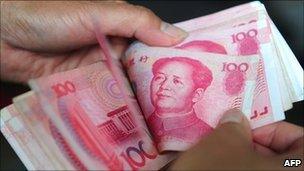China raises income tax threshold
- Published

Controlling inflation is the Chinese government's top priority this year
China has decided to raise the level at which people start paying income tax.
The standing committee of the National People's Congress is lifting the threshold from 2,000 yuan ($309; £193) to 3,500 yuan a month.
The official Xinhua news agency said the committee had decided against a previous suggestion of 3,000 yuan after a strong online response from citizens.
The move came on the eve of the 90th anniversary of the founding of the ruling Communist Party.
The committee said that raising the threshold was "necessary and timely", would reduce the tax burden on people with low incomes and would also help to reduce inequality.
Analysts said the government was concerned to stem any social unrest because of the widening gap between the rich and poor.
"It is a serious attempt to maintain social stability and redress the problems of inflation," said Steve Tsang, director of the China Policy Institute at the University of Nottingham.
The rate of inflation in China hit 5.5% last month, its highest level in almost three years.
Food prices, which make up a large proportion of poorer families' spending, were 11.7% higher in May than a year earlier.
Some 82,707 citizens commented on the draft plans, according to Xinhua, of whom 83% said the threshold should be higher.
"The change was made thanks to the appeal by netizens and comments that we received," committee member Ye Qing said on the social networking site Weibo.
About 12% of the workforce earn more than 3,000 yuan a month.
- Published29 June 2011
- Published27 June 2011
- Published14 June 2011